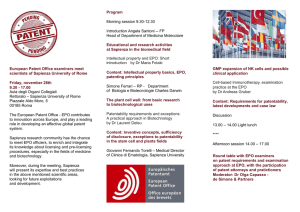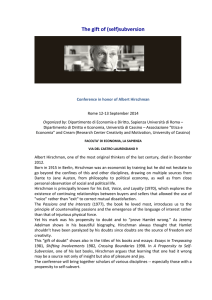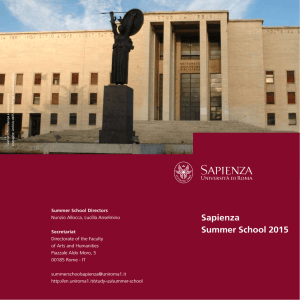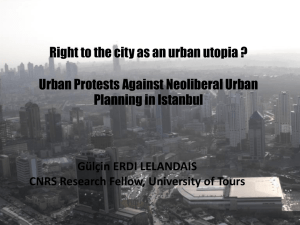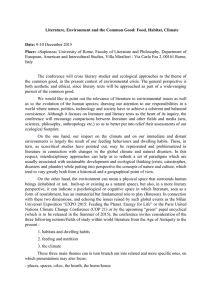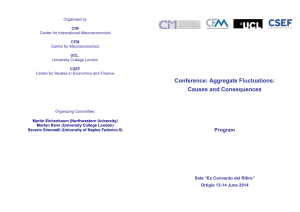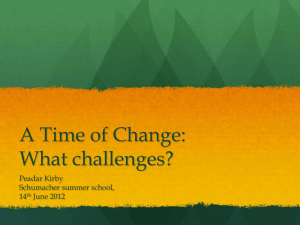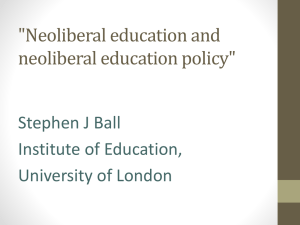THE NEOLIBERAL CITY
advertisement
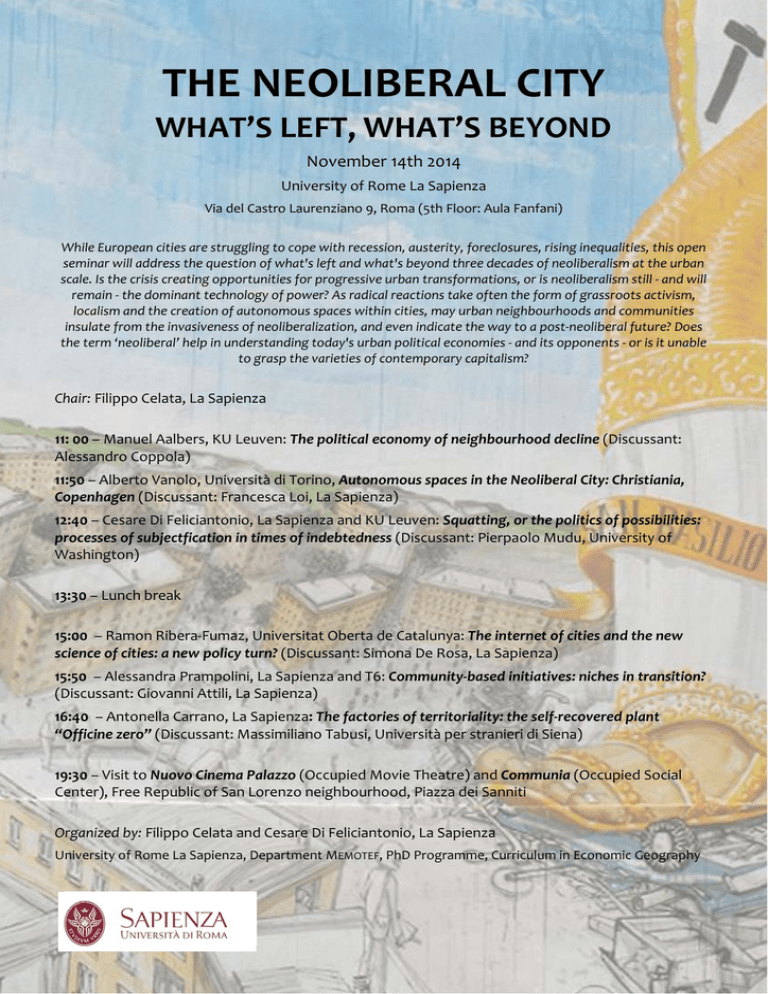
THE NEOLIBERAL CITY WHAT’S LEFT, WHAT’S BEYOND November 14th 2014 University of Rome La Sapienza Via del Castro Laurenziano 9, Roma (5th Floor: Aula Fanfani) While European cities are struggling to cope with recession, austerity, foreclosures, rising inequalities, this open seminar will address the question of what's left and what's beyond three decades of neoliberalism at the urban scale. Is the crisis creating opportunities for progressive urban transformations, or is neoliberalism still ‐ and will remain ‐ the dominant technology of power? As radical reactions take often the form of grassroots activism, localism and the creation of autonomous spaces within cities, may urban neighbourhoods and communities insulate from the invasiveness of neoliberalization, and even indicate the way to a post‐neoliberal future? Does the term ‘neoliberal’ help in understanding today's urban political economies ‐ and its opponents ‐ or is it unable to grasp the varieties of contemporary capitalism? Chair: Filippo Celata, La Sapienza 11: 00 – Manuel Aalbers, KU Leuven: The political economy of neighbourhood decline (Discussant: Alessandro Coppola) 11:50 – Alberto Vanolo, Università di Torino, Autonomous spaces in the Neoliberal City: Christiania, Copenhagen (Discussant: Francesca Loi, La Sapienza) 12:40 – Cesare Di Feliciantonio, La Sapienza and KU Leuven: Squatting, or the politics of possibilities: processes of subjectfication in times of indebtedness (Discussant: Pierpaolo Mudu, University of Washington) 13:30 – Lunch break 15:00 – Ramon Ribera‐Fumaz, Universitat Oberta de Catalunya: The internet of cities and the new science of cities: a new policy turn? (Discussant: Simona De Rosa, La Sapienza) 15:50 – Alessandra Prampolini, La Sapienza and T6: Community‐based initiatives: niches in transition? (Discussant: Giovanni Attili, La Sapienza) 16:40 – Antonella Carrano, La Sapienza: The factories of territoriality: the self‐recovered plant “Officine zero” (Discussant: Massimiliano Tabusi, Università per stranieri di Siena) 19:30 – Visit to Nuovo Cinema Palazzo (Occupied Movie Theatre) and Communia (Occupied Social Center), Free Republic of San Lorenzo neighbourhood, Piazza dei Sanniti Organized by: Filippo Celata and Cesare Di Feliciantonio, La Sapienza University of Rome La Sapienza, Department MEMOTEF, PhD Programme, Curriculum in Economic Geography THE NEOLIBERAL CITY: WHAT’S LEFT, WHAT’S BEYOND ABSTRACTS Manuel Aalbers, The political economy of neighbourhood decline Abstract: Spaces of decline, exclusion or vulnerability are produced. Neighborhood decline is not a natural thing but a result of the actions of abstract space makers such as governments, lenders, brokers, landlords and developers. Both public and private actors do not simply limit their risk in low‐ income neighborhoods, but actively and passively structure the process of neighborhood decline, e.g. by producing maps that not only describe but also prescribe neighborhood decline. The withdrawal of mortgage loans and insurance, city services, and investment more generally speaking, demonstrates the ways states and companies act upon perceived neighborhood decline and contribute to the social, physical and symbolic construction of neighborhood decline. Alberto Vanolo*, Autonomous spaces in the neoliberal city: Christiania, Copenhagen Abstract: Christiania is an autonomous Free Town, located in the centre of Copenhagen. Born as a squat in 1971, it is today a central node in the geography of activism, anarchism and alternative social life. The proposed analysis of Christiania will focus on two urban dimensions. First, the Free Town is considered as a creative area, but its peculiarities troubles mainstream conceptions of creativity by revealing that social innovation and experimentation are fluid and situated. Secondly, the case of Christiania is peculiar because of the hybridisation of forces of autonomy and of forces of neoliberalisation. In fact, following 40 years of struggles and negotiations with the Danish institutions, an agreement signed with the state in 2011 to guarantee the survival of Christiania now regulates various domains that used to be self‐regulated by the community, and therefore limits Christiania’s autonomy. It derives that autonomy is always fractured, partial and ongoing, and that the tensions between the forces of autonomy and neoliberalisation could potentially lead to a number of outcomes that challenge traditional understanding of both autonomy and neoliberalism in urban contexts. * Part of the presentation is extracted from a co‐authorship with Alessandro Coppola: “Normalising autonomous spaces: Ongoing transformations in Christiania, Copenhagen”, Urban Studies. Cesare Di Feliciantonio, Squatting, or the politics of possibilities: processes of subjectfication in times of indebtedness Abstract: Since the eruption of the current debt and financial crisis, squatting has (re)emerged in Rome and Barcelona as a main political practice of grassroots self‐organization to give a solution to the ‘housing question’. With indebtedness raising as a main dispositif of neoliberalism (Lazzarato, 2012), it produces new forms of both subjection and subjectification. Housing and real estate can play a pivotal role in this respect, especially to open spaces of contention to neoliberal hegemony (Marcuse, 2009). Recognizing the (re)mergence of squatting as resulting from this process, I emphasize how it embodies the model of the “politics of possibilities” proposed by Gibson‐Graham (2006). Indeed the claims addressed go beyond the real estate/housing question, as they are centred around the (urban) commons and new (indebted and precarious) subjects are cultivated. Ramon Ribera‐Fumaz, The Internet of Cities and The New Science of Cities: a new policy turn? Abstract: In recent years, there have been emerging new urban discourses based on the intensive use of information and communication technologies in urban strategies in what some call the New Science of Cities (Batty, 2013; Nature, 2010): from Smart cities to the Internet of Cities, the new Urban Science or urban informatics. Increasingly, these discourses are re‐interpreting the urban as a naturalised form Internet. This paper will be explored these discursive constructions both at the academic level and in their implementation in actual city strategies in Barcelona. Through an Urban Political Economy prism, this paper aims to critically reflect upon the contradictions of the actually existing New Science of Cities. In doing so, it intends to reflect on the implications of these discourses in cities across Europe in a context both in terms of contradictions and potential alternatives to them in the actual context of post‐recession restructuring. Alessandra Prampolini, Community‐based initiatives: niches in transition? Abstract: Community‐based initiatives (CBIs) have registered a significant growth in Europe as a result of recession and neoliberalization. Born as niches into wider networks with the aim of providing resources and services through a fairer and more sustainable approach, they are introducing new ways for local communities to deal with their needs concerning food, energy, transport, etc., also thanks to new available technologies. CBIs potential range of action and their connections’ reach are quickly expanding, together with a constantly growing awareness of their importance by communities and policy‐makers. Their role within the neoliberal cities scenario remains however unclear, limited by the unresolved tension between the cautious attitude towards what’s beyond the local focus of the initiatives themselves and the willingness to play a role in the development of new models and possibilities on a wider scale. The potential of CBIs to promote radical social changes and to impact on cities and urban politics lays also in the resolution of this tension. Antonella Carrano, The factories of territoriality: the self‐recovered plant “Officine zero” Abstract: “Ocupar, resistir, producir”. This is the motto of empresas recuperadas (trans. recovered factories), a phenomenon born in Argentina after the 2001 crisis and as a result of neoliberalization. Failed factories, abandoned by their entrepreneurs, are occupied and then managed autonomously by the workers. The empresas recuperadas in Argentina have materialized in the formation of organizations governed by the logic of cooperation and self‐management practices, that have spread to many fields and sectors, encouraging forms of collective associations, the enhancement of the nearby areas through the distribution of social and personal services, and participative projects for urban regeneration. Since then about 300 bankrupt companies have been reactivated, saving more than 15,000 jobs and creating a process of self‐management that is spreading around the world. In Rome (Italy), since the failure of Officine RSI decreed by Trenitalia, the empresa recuperada Officine Zero has been created in 2012, based on an idea of a small number of ex‐workers and of the members of the nearby community center Strike. The participation and involvement of inhabitans and workers has led to the creation in Officine Zero of a place for co‐working, some repair workshops managed by ex‐workers, a center for reuse, a catering service and a students' home. The Officine Zero is today fighting for survival, endangered by a pendant judicial auction and by housing speculation. A dense network of solidarity now connects Officine Zero to the other empresas recuperadas in Italy (Re‐Maflow, Mancoop) and in the rest of Europe. Together, they fight not only for defending the occupied places, but also in view of a much wider objective: the construction of a new type of “territorializing” economy.
